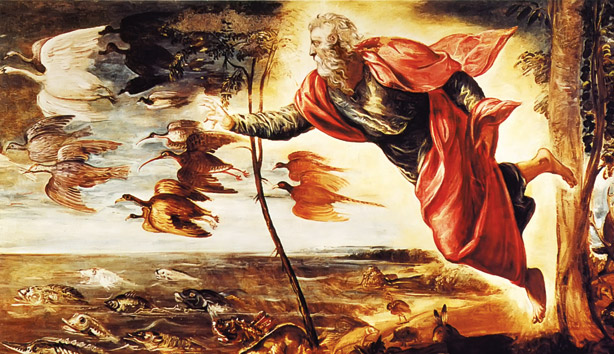The Bible & Theology Toward Christian Maturity
Jesus' Scriptures
The Foundational Story of Our Faith
By Frank Spina, Professor of Old Testament and Biblical Theology

Jacopo Tintoretto, "Creation of the Animals," Oil on Canvas, 59" × 101," 1551–52; illustration courtesy of Wikimedia Commons.
The only Scriptures Jesus and his earliest followers recognized and appealed to as God's authoritative word are the Scriptures that Christians now call the Old Testament. The authors of the Gospels likewise proclaimed that God's accomplishments in and through Jesus were consonant with these same Scriptures. The Apostle Paul affirmed that Christ died for our sins "in accordance with the Scriptures," by which he too meant the Jewish Scriptures, or Old Testament (1 Corinthians 15:3). The Church's Nicene Creed contains the same phrase: "On the third day he rose again in accordance with the Scriptures." And Paul asserted that these Scriptures were not only inspired but indispensable for Christian faith and life (2 Timothy 3:16).
It is curious, then, that Christians stress the New Testament in spite of its insistence that the Old Testament testifies to God's fulfilling actions in Jesus the Christ. If the Church is to take her Scriptures seriously, both Old and New Testaments have to be in focus.
The Synagogue divided its Scriptures into three parts: Law, Prophets, and Writings. Law is a translation of the Hebrew word "Torah," but Torah also means teaching, instruction, and story, even gospel (good news). In fact, the law in Torah only makes sense in the context of the story. In Torah, the narrative stresses God's radical grace. Law demonstrates how God's people are to respond to that grace.
Torah, also called the Pentateuch, contains the first five books of the Old Testament. If we do not start with Torah, our comprehension of Scripture's epic narrative will be truncated, haphazard, even distorted. For this reason, our first installment of Seattle Pacific University's new Lectio: Guided Bible Reading is Genesis through Exodus 19, which lays the groundwork for the rest of Torah and the remainder of Christian Scripture.
Torah provides the foundational story of creation. As God subsequently engages the created order, human beings cooperate with God, by tilling and naming, to produce an idyllic garden setting. However, disobedience leads to expulsion and a depressing downward trajectory as humanity becomes increasingly wicked. The situation is bleak.
But that is not the end of the matter. Each act of divine judgment has a corresponding act of divine grace. In the garden, God provides appropriate clothing for Adam and Eve, and they do not die immediately as was threatened. God spares the first murderer, Cain, from capital punishment. And when sin reaches titanic proportions, God provides the means for starting over through Noah's ark. Even the sin which infects the family of Noah, whom God saved from the flood, does not prevent their repopulating the earth — which is an implicit act of grace.
Only the story of Babel seems to have no corresponding act of grace. The reason for this is that the gracious divine action following the Babel episode is, in effect, the rest of the biblical story, beginning with God's call of Abraham and Sarah in order to bring about the blessing of all others. The election of Abraham and Sarah will eventuate in God's people, Israel, which is destined to become a holy nation and a kingdom of priests. And the New Testament teaches that Israel's mission is finally and ultimately accomplished in Jesus the Christ. Israel and Jesus together constitute God's gracious response to the human condition described in Genesis 1–11.
Torah accents God's commitment to Abraham and Sarah in spite of disobedience, doubt, and distrust. We learn how Jacob is chosen as the child of promise over his older brother in spite of the dubious behavior of both. After God's chosen family is threatened by famine and internal conflict, God saves its future improbably through the Canaanite Tamar and the enslaved Joseph. Eventually, God rescues the family after it becomes a people enslaved by Egypt. God then directs his people into a future in which Israel's messiah will complete God's purpose for the created order.
Nothing makes sense in the remainder of Scripture without this initial story. It is the beginning story of our faith.
